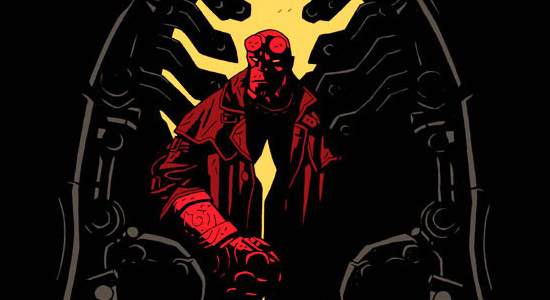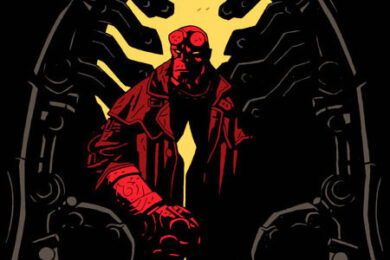In this summer of the superhero, Hellboy possesses a reassuring runt-of-the-litter appeal. The cigar-chomping, beer-swilling monster is something of a labour of love for Mexican filmmaker Guillermo del Toro, whose original 2004 Hellboy was the realisation of a long-held ambition to bring the cult comic book character to life. In the interim, of course, del Toro’s stock has risen considerably, last year’s darkly enchanting fantasy Pan’s Labyrinth earning him the fawning acclaim of misty-eyed cineastes. That del Toro has chosen to revisit the Hellboy franchise rather than pursue other, more obviously cerebral projects represents admirable contrariness.
Those expecting a high-minded existential rumination in the vein of The Dark Knight will be sorely disappointed. In fact, the differences between this exuberant confection and Christopher Nolan’s portentous offering could not be more pronounced. To put things in context: Batman’s nemesis takes the form of Heath Ledger’s twitchy, mentally unstable psychopath The Joker. Hellboy’s nemesis is Luke Goss from Bros! In his guise as nefarious underworld heir Prince Nuada he plans to bring about mankind’s destruction by uniting the Crown of Bethmora and awakening the long-dormant Golden Army. Intent on preventing this calamitous chain of events, the top-secret Bureau for Paranormal Research and Defense enlist Hellboy and his fellow monsters to track down Nuade’s twin sister Nuala, who holds the final piece of the crown.

As with the original, it’s Ron Perlman’s supremely charismatic performance which is central to this sequel’s guileless charms. Drawing heavily from the character’s hardboiled roots, his Red (Hellboy is a derogatory media nickname) is a wise-cracking, free-wheeling, blue-collar everyman with anger management issues, the sort of superhero even Homer Simpson could relate to. He’s even experiencing a bit of girl trouble, his pyrokinetic squeeze Liz (Selma Blair) growing increasingly exasperated by his wild mood swings and inattentiveness. Perlman’s cantankerous shtick is a perfect fit for Hellboy, and his interchanges with fellow benign beast Abe Sapien (think an aquatic C3PO with a Barry Manilow predilection) and disembodied spirit Johann Krauss provide for some uproarious, if slightly surreal, interspecies banter.
Yet for all Perlman’s onscreen presence, it is the director’s personality which imprints itself most forcibly on this movie. Aided by a bigger budget and greater artistic clout, that trademark del Toro flair for animation is given free reign, his boundless imagination conjuring a nightmarish dystopia of flesh-devouring creepy-crawlies, grotesquely ugly nasties and beautiful freaks. Among the most memorable of the visual flourishes include a Troll Market teeming with hideous netherworld creatures and the Angel of Death, an androgynous, eyeball-winged anthropomorphism. Compare this ornately-crafted dreamscape to the soulless CGI of, say, the recent Hulk movie and you can understand why this man is considered something of an artistic visionary.

Like its hero, Hellboy II: The Golden Army’s pleasures are uncomplicated and easy to digest. Turning convention on its head, this sequel is bolder, funnier and ultimately more entertaining than its predecessor. Combining an aesthete’s attention to detail with a genuine fanboy affection for his source material, del Toro proves that you can strive for Hollywood accessibility without resorting to Hollywood-style reductionism, in the process delivering the thinking person’s summer blockbuster.



